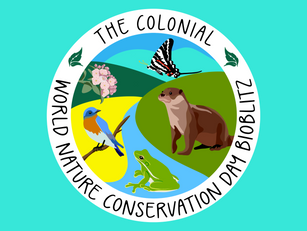top of page
Search


Field Day Success at Brandon Farms!
DCR hosted an educational field day at Brandon Farms, led by our senior agricultural conservation specialist, Robert Waring. Read more.

Samantha Pereira
Jan 9, 2025


VCAP Project Spotlight: Williamsburg Baptist Church
Read about a unique VCAP project that allowed us to cover the entire conservation landscaping costs for a church's parking lot.

Emma Rich
Jan 7, 2025


Beneficial Bugs - Wonderful Wasps
Rather than fearing wasps we should recognize their ecological value and appreciate the ecosystem services they offer. Learn more here.

Amanda Whispell
Jan 3, 2025


Creativity in Stormwater Management: Rain Garden in a Box
A "rain garden in a box” is a rain garden that is installed in an above-ground container, eliminating the need for any excavation.

Robyn Woolsey
Dec 31, 2024


CSWCD Winter Newsletter Published
CSWCD Winter 2024 Newsletter published

Amanda Whispell
Dec 31, 2024


Final Strategic Plan 2025-2028 - Available
CSWCD Strategic Plan for the 2025-2028 period is now available on our website.

Amy Walker
Dec 19, 2024


Request for Proposals: Design Services for Shoreline Stabilization / Living Shoreline Projects in Charles City County, Virginia
CSWCD is seeking proposals from qualified firms for living shoreline design and construction services on multiple agricultural properties.

Robyn Woolsey
Dec 12, 2024


CSWCD Annual Report - Fiscal Year 2024
The Colonial Soil and Water Conservation District Annual Report for Fiscal Year 2024 is now available for download on our website.

Amanda Whispell
Oct 11, 2024


DRAFT Strategic Plan - Request for Comments
We invite members of the community, to review the draft of our strategic plan for 2025-2028 and provide input by November 1, 2024.

Amy Walker
Oct 11, 2024


Colonial Soil and Water Conservation District Eager To Help Residents
CSWCD has been educating the public on conservation and land protection efforts for years.
News Reprint
Sep 25, 2024


VCAP Project Spotlight: Native Landscaping Education at Brickyard Landing
People worry native habitats will look too wild for their yard, so it is easier with local native habitats we can use as an a demonstration.

Robyn Woolsey
Sep 11, 2024


Youth Conservation Leadership Institute
Youth Conservation Leadership Institute is a program for students in 9-12 grade and focuses on volunteer service & environmental stewardship

Amanda Whispell
Aug 14, 2024


Dragonfly Field Day with the Historic Rivers Master Naturalists
I spent the afternoon with several members of the Historic Rivers Master Naturalists group looking for dragonflies and damselflies in Colby

Amanda Whispell
Aug 12, 2024


A farmer’s perspective on radish cover crop
The presence of worms in cover crop fields is an indicator of a healthy soil ecosystem and the deep roots of tillage radishes provide access

Robert Waring
Aug 6, 2024


Understanding the Differences Between Determinate and Indeterminate Tomatoes
Tomatoes are commonly grown in many home gardens. Learn the difference between determinate and indeterminate so you can decide which to grow

Logan Ellis
Aug 2, 2024


Department of Forestry Grants
A summary about currently offered grants from the VA Department of Forestry from local Community Forestry Specialist, Daniel Ronald Brooks.

Daniel Ronald Brooks
Aug 1, 2024


Results from the Colonial World Nature Conservation Day BioBlitz 2024
The results of the First Annual Colonial World Nature Conservation Day BioBlitz in July 2024.

Amanda Whispell
Jul 31, 2024


Beneficial Bugs - Hoverflies
Hoverflies are amazing little insects and they do so much good, which is why they are the beneficial insect I will be talking about today.

Amanda Whispell
Jul 30, 2024


In August, our very own Dave Beals will be featured in an article in Next Door Neighbors - "Dave for Dirt"
A reprint of "Dave for Dirt," which was originally published in the August 2024 edition of the Williamsburg's Next Door Neighbors periodical
News Reprint
Jul 29, 2024


Should I water the grass?
Many homeowners have irrigation systems to water their lawns but when & how much to water the grass are questions that deserve investigation

Jim Wallace
Jul 25, 2024


Colonial World Nature Conservation Day BioBlitz
A short note summarizing the first annual Colonial World Nature Conservation Day BioBlitz at New Quarter Park.

Amanda Whispell
Jul 24, 2024


We're looking forward to Colonial World Nature Conservation Day BioBlitz 2024
Join us for the Colonial World Nature Conservation Day BioBlitz! July 20, 2024 | New Quarter Park | 8:00 am -...

Amanda Whispell
Jul 18, 2024


2025 VACS Signup is Here!
July 1-August 30: agricultural producers in the Colonial District can apply to participate in the Virginia Agricultural Cost Share Program.

Logan Ellis
Jul 15, 2024


Whole Farm Approach
We're participating in a program that let's us provide comprehensive conservation planning for farms in our district - Whole Farm Approach

Samantha Pereira
Jul 9, 2024
bottom of page
